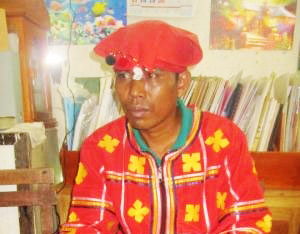Church leaders from US in Southern Mindanao for advocacy mission
Los Angeles, CA – Alarmed by the increasing human rights and environmental violations in the Philippines, a delegate of church leaders and activists is holding a pastoral, advocacy and medical mission focused on indigenous peoples in Southern Mindanao. August 9 marks the 18th year of the United Nation’s Declaration of the World Indigenous Peoples’ Day. […]


Los Angeles, CA – Alarmed by the increasing human rights and environmental violations in the Philippines, a delegate of church leaders and activists is holding a pastoral, advocacy and medical mission focused on indigenous peoples in Southern Mindanao.
August 9 marks the 18th year of the United Nation’s Declaration of the World Indigenous Peoples’ Day.
Luis Buktaw, leader of the United Methodist Church (UMC) in Pasadena, said,”We would like to stand in solidarity with the indigenous people and learn about their environment, social and health issues. We will be doing a non-governmental agency based type of health services. And show Filipino-Americans here what we can do to help with the health issues and other concerns of people in our homeland.”
Participants in the mission, to be held from August 8 to 21 in Davao del Norte, are from Rosewood UMC, International League of People’s Struggles US, Sigaw, Habi Arts, Justice and Compassion Essential Ministry, Anakbayan San Diego and Los Angeles, Soka Gakkai International, Grace UMC, Fil-Am Health Workers Association, and other groups.
In late July, the church leaders visited the Philippine Consulate in LA to discuss the security of the mission members, and the killings of environmental and human rights advocates in the Philippines.
Deputy Consul General Dan Espiritu promised,”We will forward your papers, reports and evidence of any human rights violations to the Department of Foreign Affairs, but I cannot promise you a response. I am not the one who’s suppose to take care of these political matters.”
The mission will focus on areas where environmental degradation, human rights violations and health situations are appalling. Its findings will be presented to the media in a public forum in Davao City and in the US upon return of the participants. The findings will also be used in legislative and advocacy work in the US to “promote, protect and uphold the rights, welfare and well-being of indigenous peoples in the Philippines.”
Attacks on human rights and environmental defenders have increased significantly over the past few months.
According to the Mindanao-based indigenous peoples group Kalumaran, military operations have spawned violations of human rights victimizing innocent civilians. The most recent victim is Totong Mabinsi, a Dibabawon indigenous in Laak, Compostela Valley, who was killed by military forces last July 22.
Under the Aquino administration, Lumad leaders have also been murdered by paramilitary groups backed by the Armed Forces of the Philippines. One of them is the Matigsalug leader Jimmy Liguyon of San Fernando, Bukidnon who resisted the entry of mining and agri-business plantations in their ancestral land.
Aside from being victims of human rights and environmental violations, indigenous people are part of the majority with low to no proper access to health services, according to the mission, which will provide basic medical services to far-flung areas in Davao del Norte.
The health budget recommended by the World Health Organization is 5% of Gross National Product, but the current health budget allotted by the Aquino administration is only at 2.74% or P49.9 Billion.
Bishop Mary Ann Swenson of the United Methodist Church in Los Angeles said, “As the political and economic situation in Davao worsens, the need and urgency for solidarity and acts of love increases. Indigenous and farming communities, church workers, human rights and environmental defenders continue their advocacy work despite the upsurge in human rights violations. The communities have been veiled with fear and suffer from the violence of cyclical physical and economic displacement, trauma and physical harm.”
Swenson cited the occupation of schools by the Philippine military as one example of war crimes being committed against children in the region.
“As a Church, the UMC has consistently supported the call for peace and justice in the Philippines. The Church also continues to condemn the use of US military aid in operations that violate human rights in the Philippines,” Swenson added.
